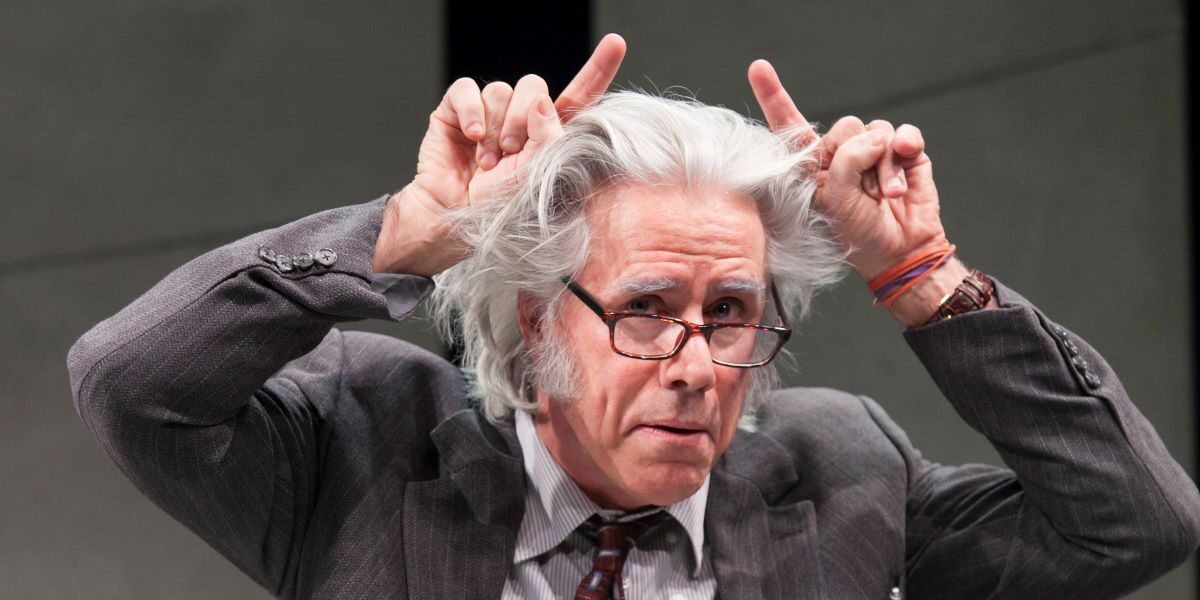William M Kunstler’s name is one that needs no introduction to my generation – the leading American progressive defence lawyer of the 60s and 70s, who himself became the target of protests in the 1990s once he extended his skills to the likes of Mafia boss John Gotti and Yusef Salaam, of the Central Park Five. Seeing himself very much in the tradition of Clarence Darrow and Atticus Finch, he believed everyone, however unsavoury, deserved the right of legal defence, and he was not afraid to make himself unpopular on all sides of the political divide in upholding that principle. But for younger people he is perhaps only a vague name, and that is where this play comes in….
We encounter him, played by Jeff McCarthy, in 1995 at the very end of his life, given the opportunity to review his career highlights in a lecture at Columbia University. We hear the sound of protestors outside, and even the chair of the meeting does not want to be there, reluctantly taking the place of the student who originally made the booking. Kunstler enters, limping, dishevelled, in a shabby suit, picking his way through rubbish strewn by an earlier phase in the protest. It is not a promising start.
However, such is McCarthy’s skill as a performer that 90 minutes later we emerge not only with a rounded sense of a larger-than-life lion of the law, but also having experienced an exhilarating slice through much of American social history from 1960 to 1990. Credit must also go to playwright Jeffrey Sweet, who has stitched together a mixture of compelling trial and media testimony, with materials from Kunstler’s own published and unpublished writings. It takes skill to confect an apparently random ramble through a varied career of highs and lows, and which still results in such a richly detailed portrait of its subject.
Nor is this an uncritical portrait. A vital role is played here by Nykila Norman as Kunstler’s student interlocutor, Kerry. It is important both for dramatic effect and intellectual balance that Kunstler’s assumptions are challenged and he does not have it all his own way. Norman does a great job, as much in her facial expressions, as through dialogue in making us reflect on how much Kunstler’s stances were based on ego as much as principle. We are encouraged, through her, to question how far he actually had his clients’ interests at heart, as opposed to his own agenda. Was his use of the defence of ‘black rage’ in fact a form of condescending racism? How would he have survived in the age of #Metoo and ideological cancellation? This is not a two-dimensional heroic portrait, and is all the better as a play for it.
As this summary makes clear, the play could not be more topical for a whole host of reasons, both substantive and trivial. Columbia students are protesting once more, the conflict between due process and rights of political protest is as acute as ever, and the boundaries of freedom of expression appear to be as fraught and contested, if not more so, than fifty years ago. Kunstler’s claim that the state’s conversion and downgrading of the truly political into the merely criminal requires consideration now, just as much as it did in the 60s; so too does his questioning of the unexamined legality of Establishment state action.
This is a small-scale production in a simple black-box pub theatre in South London. It is world away from the other more glitzy and glamorous shows I have reviewed in the past month or so. Yet it is by some distance the most thought-provoking, uncomfortable and effective piece of drama for these times of ours that I have seen in a long while. As so often is the case, less, when well done, is simply more.
Writer: Jeffrey Sweet
Director: Meagan Fay
Cast: Jeff McCarthy and Nykila Norman
Until 18 May 2024
90 minutes, no interval

